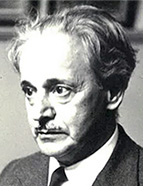

This gave rise to a second period in the 1950s, with the publication of “ Le sens de l ’ histoire ” in the Revista da Faculdade de Letras in 1953, followed by: “ Lições de História, Lições da História ” [ History Lessons, History Lessons ] (1959); “ Simbolismo e História ” [ Symbolism and History ] (1960); “ Razão – História – Ideal ” [ Reason - History - Ideal ] (1961); “ O Reverso ” [ The Reverse ] (1963, therefore posthumous), all published in Revista Ocidente .
These texts generally show an evolutionary development of the major thematic cores , the methodological approach and the critical perspectives that presided over the first moment. In these developments, the imprint of the context is reflected, for example, in the consideration of a politicised interpretation of H istory, based on the tragedy-farce binomial, as two lines of the same mythification, resulting from the substitution of judgements of fact for judgements of value, where one blames misery and the other greatness ( OF III , p. 30), or in the discussion of the instructive scope of H istory, which he denies, distinguishing between what belongs to historical knowledge and what goes into morality or politics, only to accept the possibility of history lessons ( OF III , p. 522). In line with his initial condemnation of the dangers of patriotic history, which he considers ipso facto favours polarities, hatreds , and wars ( OF I , p. 54), he continues to express great concern about all forms of alliance between historiography and ideology, which replace facts with symbols and generate delusions about superior men and extraordinary peoples ( OF III , p. 593) and therefore with this rejection of scientific objectivity, contain warmongering and despotism .
Similarly, these texts suggest an intention to intervene in the ongoing historiographical debate, both nationally and internationally, for which the French language would once again be useful, with the rejection of notions such as tendency, “ le nom donné par un procédé vulgaire d’objectivation, non plus au résultat probable mais à la probabilité (substantivée) du résultat ” ( OF III , p. 289), factor, “ l’affaibl issement valoratif de celui de ‘causes ’ ” ( OF III , p. 293), or cycle, “ transposition de “l’éternel retour” philosophique sur le plan historique et même scientifique ” ( OF III , p. 290) .
This work is financed by national funds through FCT - Foundation for Science and Technology, I.P, in the scope of the projects UIDB/04311/2020 and UIDP/04311/2020.
